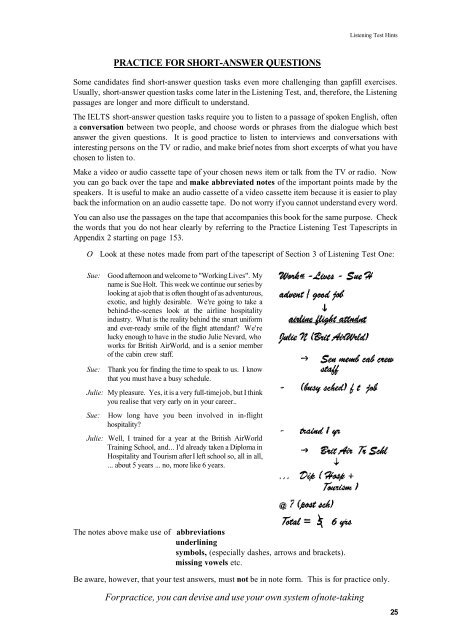Create successful ePaper yourself
Turn your PDF publications into a flip-book with our unique Google optimized e-Paper software.
Listening Test <strong>Hints</strong><br />
PRACTICE FOR SHORT-ANSWER QUESTIONS<br />
Some candidates find short-answer question tasks even more challenging than gapfill exercises.<br />
Usually, short-answer question tasks come later in the Listening Test, and, there<strong>for</strong>e, the Listening<br />
passages are longer and more difficult to understand.<br />
The <strong>IELTS</strong> short-answer question tasks require you to listen to a passage of spoken English, often<br />
a conversation between two people, and choose words or phrases from the dialogue which best<br />
answer the given questions. It is good practice to listen to interviews and conversations with<br />
interesting persons on the TV or radio, and make brief notes from short excerpts of what you have<br />
chosen to listen to.<br />
Make a video or audio cassette tape of your chosen news item or talk from the TV or radio. Now<br />
you can go back over the tape and make abbreviated notes of the important points made by the<br />
speakers. It is useful to make an audio cassette of a video cassette item because it is easier to play<br />
back the in<strong>for</strong>mation on an audio cassette tape. Do not worry if you cannot understand every word.<br />
You can also use the passages on the tape that accompanies this book <strong>for</strong> the same purpose. Check<br />
the words that you do not hear clearly by referring to the Practice Listening Test Tapescripts in<br />
Appendix 2 starting on page 153.<br />
O Look at these notes made from part of the tapescript of Section 3 of Listening Test One:<br />
Sue: Good afternoon and welcome to "Working Lives". My<br />
name is Sue Holt. This week we continue our series by<br />
looking at a job that is often thought of as adventurous,<br />
exotic, and highly desirable. We're going to take a<br />
behind-the-scenes look at the airline hospitality<br />
industry. What is the reality behind the smart uni<strong>for</strong>m<br />
and ever-ready smile of the flight attendant? We're<br />
lucky enough to have in the studio Julie Nevard, who<br />
works <strong>for</strong> British AirWorld, and is a senior member<br />
of the cabin crew staff.<br />
Sue:<br />
Thank you <strong>for</strong> finding the time to speak to us. I know<br />
that you must have a busy schedule.<br />
Julie: My pleasure. Yes, it is a very full-time job, but I think<br />
you realise that very early on in your career..<br />
Sue:<br />
How long have you been involved in in-flight<br />
hospitality?<br />
Julie: Well, I trained <strong>for</strong> a year at the British AirWorld<br />
Training School, and... I'd already taken a Diploma in<br />
Hospitality and Tourism after I left school so, all in all,<br />
... about 5 years ... no, more like 6 years.<br />
The notes above make use of abbreviations<br />
underlining<br />
symbols, (especially dashes, arrows and brackets).<br />
missing vowels etc.<br />
Be aware, however, that your test answers, must not be in note <strong>for</strong>m. This is <strong>for</strong> practice only.<br />
For practice, you can devise and use your own system of note-taking<br />
25




